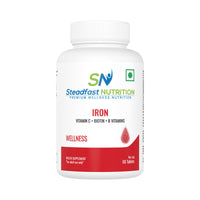Do you feel drained by mid-morning? Fed up with pushing through fatigue all day? Enduring constant exhaustion doesn't have to be your usual state. It's your body's signal to prioritise sleep quality or quantity and perhaps consider lifestyle adjustments, including nutritious food.
The fuel you provide your body directly affects its performance. Optimal energy levels come from consuming high-quality food.
In addition to food choice, timing matters too. Have you experienced feeling sluggish after a heavy meal? It's because your body redirects energy towards digestion, leaving you drained.
You’re probably aware of what's behind your fatigue. By implementing some straightforward lifestyle adjustments, you likely can restore vitality to your life. Take into account these various methods to enhance your energy levels.
Potential reasons why you’re always tired
Feeling constantly tired can be due to various reasons. Poor sleep quality, stress, and anxiety are common culprits. Your diet and exercise habits can also play a significant role, as can underlying medical conditions like anaemia or thyroid disorders. Additionally, medications, dehydration, and mental health issues like depression can contribute to persistent fatigue. Identifying the cause of your tiredness is crucial for finding effective solutions. If you're consistently feeling tired, consider consulting a healthcare professional for personalised advice and support. Here are a few possible reasons behind your lethargic days:
1. Stress
Although some stress is normal, chronic stress can lead to fatigue. Chronic stress may lead to stress-related exhaustion disorder (ED), a medical condition characterised by psychological and physical symptoms of exhaustion. Furthermore, chronic stress may cause functional changes in your brain and lead to chronic inflammation, contributing to symptoms like fatigue.
Stress and anxiety can impact your energy and leave you feeling physically exhausted. Unplug and relax by doing yoga, meditating or trying other forms of self-care.
2. Nutrient Deficiencies
Feeling consistently exhausted, even with more than 7 hours of sleep, could be due to nutrient deficiencies.
Deficiencies in the following nutrients have been associated with fatigue:
- Iron
- Riboflavin (Vitamin B2)
- Niacin (Vitamin B3)
- Pantothenic acid (Vitamin B5)
- Pyridoxine (Vitamin B6)
- Folate (Vitamin B9)
- Vitamin B12
- Vitamin D
- Vitamin C
- Magnesium
If you're battling fatigue, it's advisable to consult your healthcare provider about the possibility of testing for deficiencies. Typically, once your nutrient levels are restored to normal, fatigue related to deficiencies tends to improve.
3. Lack of Sleep
Adequate sleep is crucial for overall health, yet many people don't get enough, leading to fatigue. Vital processes like hormone release and cell repair occur during sleep, leaving individuals feeling refreshed and energised. While sleep needs vary, adults should aim for at least 7 hours of sleep per night. Insufficient sleep might seem like an obvious culprit and can profoundly impact your focus and overall health. Insomnia, characterised by difficulty falling or staying asleep, can stem from various factors including medical conditions and stress. Treatments such as natural supplements or medication may help manage insomnia, with medical consultation advised for appropriate care.
4. Poor Diet
Your diet greatly influences how you feel. Maintaining energy levels and supplying essential nutrients relies on a balanced, nutrient-rich diet. Inadequate calorie and protein intake can deplete fat and muscle, contributing to fatigue. Opting for a diet low in processed foods and sugars while prioritising nutrient-dense options like fruits, vegetables, legumes, and healthy proteins can provide optimal nutrition, combating fatigue.
5. Excessive coffee intake
Excessive caffeine consumption can paradoxically lead to fatigue. While coffee and energy drinks may offer a temporary energy boost, relying too heavily on them can disrupt sleep patterns, resulting in tiredness later.
6. Low Hydration
Maintaining adequate hydration is crucial for sustaining energy levels. Throughout the day, numerous biochemical processes in your body result in water loss, necessitating replenishment.
Dehydration occurs when the body loses more water through urine, stool, sweat, and breath than it takes in, which can lead to decreased energy levels and reduced concentration.
While the recommendation of 7-8 glasses of water daily is often cited, individual hydration needs vary based on factors like weight, age, gender, and activity level. The key is to drink enough to sustain proper hydration. Common signs of dehydration include thirst, fatigue, dizziness, and headaches.
7. Unhealthy weight gain
Maintaining a healthy body weight is crucial for overall well-being. Obesity increases the risk of chronic conditions like type 2 diabetes and heart disease which are closely linked to obstructive sleep apnea and daytime sleepiness. Achieving a healthy weight supports better sleep quality and energy levels, while prioritising good sleep aids in weight management and reduces fatigue.
8. Hypothyroidism
Hypothyroidism occurs when the thyroid gland, located at the base of your neck, becomes underactive, resulting in a slower metabolism, causing feelings of sluggishness and potential weight gain.
9. Depression
Depression is often viewed as primarily an emotional condition, yet it manifests in numerous physical symptoms as well. Fatigue, headaches, and diminished appetite are frequently reported. If feelings of exhaustion and low mood persist for an extended period, it's advisable to seek medical attention.
How much sleep should you get?
For optimal health, adults require a minimum of seven hours of sleep every night, while babies, young children, and teens need even more to support their growth and development. Understanding these general guidelines is essential, followed by considering individual needs based on factors like activity level and health status. Implementing healthy sleep practices is crucial to ensure adequate rest and keep fatigue away.
|
Age group |
The Recommended amount of sleep
|
|
Infants 4 months to 12 months
|
12 to 16 hours per 24 hours, including naps
|
|
1 to 2 years
|
11 to 14 hours per 24 hours, including naps
|
|
3 to 5 years
|
10 to 13 hours per 24 hours, including naps |
|
6 to 12 years
|
9 to 12 hours per 24 hours
|
|
13 to 18 years
|
8 to 10 hours per 24 hours
|
|
Adults
|
7 or more hours a night
|
Your sleep needs can evolve with age, typically stabilising around age 20. While older adults generally require less sleep, various factors such as environment, behaviour, and health can influence individual sleep requirements throughout life.
Feeling tired after a full night's sleep could stem from several factors, including sleep environment, disturbances from bed partners or pets, sleep disorders like insomnia or sleep apnea, chronic pain, or underlying medical and mental health conditions. Addressing sleep hygiene practices and seeking medical evaluation for any underlying issues may help improve sleep quality and alleviate fatigue.
Does your lifestyle need a change?
Aiming for 7 to 8 hours of sleep each night is recommended for optimal health. Utilising a sleep calculator can help determine your ideal bedtime based on your wake-up time. Aim to wake up at the end of a sleep cycle for maximum restfulness.
Quality sleep is crucial for overall well-being. If you encounter challenges falling or staying asleep, consulting a healthcare professional is advisable. They can assess underlying causes of sleep issues and provide appropriate guidance and support.
A sedentary lifestyle can also be a cause of fatigue, so make sure you get enough exercise. Not having a nutritious diet can also be a reason, so opt for healthy over processed or junk food.
Self-Help Tips to Fight Fatigue
1. Balanced diet
A balanced diet is crucial for boosting energy levels and promoting overall health. Incorporating whole, fresh foods from diverse food groups ensures adequate nutrient intake. Pairing unrefined carbohydrates with protein sustains energy levels, while ample fibre and anti-inflammatory foods support healthy digestion. Research suggests a link between irritable bowel syndrome (IBS) and chronic fatigue, emphasising the importance of diet in managing energy levels and digestive health.
2. Include Iron-Rich Foods
Prioritising iron-rich foods is essential to combat anaemia, a condition resulting from iron deficiency that often leads to fatigue. Low haemoglobin levels associated with anaemia hinder oxygen transport to tissues and muscles, weakening the immune system and increasing susceptibility to illness and infection, which leads to fatigue.
Anaemia is more prevalent in women, often stemming from factors like pregnancy or heavy menstruation. Treatment options include dietary adjustments and medication.
Incorporating iron-rich foods into your diet can help alleviate anaemia. These include leafy green vegetables, fortified cereals and bread, meat, beans, peas, lentils, liver, nuts, and whole grains. You can also add Steadfast Nutrition's Iron Supplement.
3. Get moving
Engage in physical activity to stimulate the release of energising hormones after exercise. Breaking down physical activity into three 10-minute sessions throughout the day can accumulate to the recommended 30 minutes of daily activity.
4. Moderate alcohol intake
Reducing alcohol consumption is the key as it prompts your body to produce melatonin, inducing drowsiness and lowering energy levels. Moreover, excessive drinking can disrupt sleep quality, resulting in fatigue the following day.
5. Nourish your body
Opt for balanced meals and snacks comprising complex carbohydrates, protein, and healthy fats to sustain energy levels. Avoid foods high in sugar and refined carbohydrates, as they cause blood sugar spikes followed by crashes, leading to fatigue. In case your daily diet lacks adequate nutrients, you can opt for Steadfast Nutrition’s Multivitamin with all the essential vitals.
Role of Nutrients in fighting fatigue
Vitamins and minerals are essential for maintaining energy levels, supporting overall health, and ensuring proper bodily function. While obtaining these nutrients from food is ideal, supplements can be helpful if you're unable to meet your daily requirements through diet alone.
1. Iron
Iron is essential for your body to produce haemoglobin, a protein in your blood responsible for carrying oxygen throughout your body. Low iron levels can result in fatigue, exhaustion, and decreased energy levels.
2. Vitamin D
Vitamin D, known as the "sunshine vitamin" for its synthesis in the skin upon exposure to sunlight, is also found in foods like fatty fish and egg yolks. Inadequate intake can impact bone health, increase susceptibility to illnesses, and result in muscle pain and weakness. Check best vitamin d capsule from Steadfast.
3. Vitamin B12
Vitamin B12 is considered a co-enzyme in folate metabolism and is essential for treating fatigue since it plays critical functions in red blood cell formation, energy generation, and nervous system function. It promotes red blood cell production, ensuring enough oxygen transfer to tissues and organs, which is necessary for energy maintenance. It also preserves the myelin coating, which protects nerve fibres and allows for normal nerve function, essential for muscle coordination and avoiding fatigue-induced nerve damage.
4. Ashwagandha
Ashwagandha, also known as "Indian ginseng," is an adaptogenic herb used to boost energy and reduce pain and anxiety by regulating levels of cortisol, a stress hormone. One can improve fatigue issues by adding ashwagandha as a supplement to their daily routine.
5. Electrolytes
Electrolytes such as sodium, potassium, chloride, magnesium, calcium, phosphate, and bicarbonates are essential for maintaining cellular function and conducting nerve and muscle impulses. They come from food and fluids and must be balanced for proper body functioning. Imbalances can disrupt bodily functions and may lead to severe health complications, including fatigue. Electrolytes support heart, nerve, muscle health, and bone strength. Proper hydration is crucial for maintaining electrolyte levels, especially during prolonged diarrhoea, vomiting, or sweating. Dehydration can cause fatigue and mood swings, making it vital to balance electrolytes like sodium, potassium, and magnesium for optimal hydration and health. So, including a good electrolyte formula in your diet can do wonders. Buy best electrolyte drink from Steadfast.
6. Vitamin C
Vitamin C, also known as ascorbic acid, is essential for maintaining a healthy immune system and is found abundantly in foods like citrus fruits. Adequate intake can help shorten the duration and severity of the common cold, promoting faster recovery and increased energy levels. Additionally, vitamin C aids in iron absorption, crucial for preventing iron-deficiency anaemia, which can lead to fatigue. Emerging research suggests a link between vitamin C and reducing delayed-onset muscle soreness (DOMS), potentially enhancing performance and energy levels after a workout. Check Steadfast's vitamin c tablet price.
Conclusion
Implement changes to your lifestyle to enhance your vitality, beginning with what resonates most with you and progressing from there. By doing so, you're likely to experience improvements in your energy levels, enabling you to feel your best every day.
Most importantly, listen to your body and acknowledge your feelings. Take breaks and prioritise rest when necessary. Avoid overexertion and adhere to a healthy course of action. You’re bound to beat fatigue this way.






